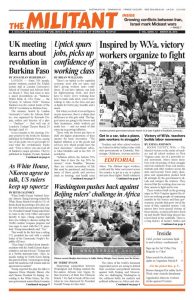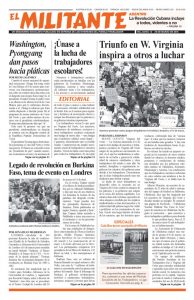LONDON — Some 200 people, mainly students, packed the Khalili lecture hall at London University’s School of Oriental and African Studies March 6. They had come to hear a panel presentation on “Sankara: World Bank & CFA Franc — the Tyranny of African Debt.” Thomas Sankara was the central leader of the 1983-87 revolution in Burkina Faso.
The seminar, hosted by London University’s Centre for African Studies, was organized by Riccardo Dujany, author and director of a play — “Sankara” — that will run at London’s Cockpit Theatre March 20 through April 14.
In his remarks to the meeting, Dujany pointed to the books by Sankara published by Pathfinder Press, saying one of his goals was to get people to read what the revolutionary leader said. “This is where you can read all of Sankara’s major speeches. They’re published in English, French, Spanish and Farsi,” he said. Dujany had invited Pathfinder to have a table at the seminar, and at every showing of the play.
The Pathfinder table featured an attractive display of photographs and quotes from Thomas Sankara Speaks , We Are Heirs of the World’s Revolutions and Women’s Liberation and the African Freedom Struggle. The table was mobbed. Participants bought 104 books by Sankara, 142 books in all, and two subscriptions to the Militant. A dozen people left their contact information, saying they’d get books when they went to the play or volunteering to help get the books around.
A former colony of France, Burkina Faso — then called Upper Volta — with more than 7 million inhabitants was among the world’s poorest countries. Under Sankara’s leadership, the revolutionary government mobilized peasants, workers, craftsmen, women and youth to carry out literacy and immunization drives; to combat the oppression of women; end exploitative relations on the land; to sink wells, plant trees, build dams, erect housing; to free themselves from the imperialist yoke and stand with all those engaged in that fight internationally.
“The most important thing for us,” said Sankara, “is the transformation of people’s attitudes.” Each Burkinabè “feels that wielding power is now his business.”
Sankara fought for a world built on different economic and social foundations. They can’t be created by “technocrats,” “financial wizards,” or “politicians,” but only by masses of workers and peasants whose labor, joined with the riches of nature, is the source of all wealth, Mary-Alice Waters, a leader of the Socialist Workers Party in the U.S. and president of Pathfinder Press, said at a 2005 presentation of one of Sankara’s books in Cuba. “Sankara stood out among the leaders of the struggles for national liberation in Africa in the last half of the 20th century because he was a communist.”
“Sankara was not only a leader of the people of Africa. He was not only a spokesman for the oppressed and exploited of the semicolonial countries,” she said. “He gave leadership to working people in the imperialist world as well.”
The revolution was overthrown on Oct. 15, 1987, when Sankara and a number of other leaders were slain in a counterrevolutionary coup organized by Blaise Compaoré.
Panelists at the seminar included Becky Branford, a journalist at BBC News who had met Sankara when she won a “young journalist of the year” award at age 16 and was sent to Burkina Faso; Lamine Konkobo, a youth in Burkina Faso during the revolution and today a journalist for BBC Afrique; Rachel Oliver of Positive Money UK; and Dujany. The event was chaired by Seraphin Kamdem, a senior fellow at the School of Oriental and African Studies.
The highlight of the night was a five minute monologue from Sankara’s speeches taken from the play and delivered by Ike Chuks, who plays the title role. Chuks and the rest of the cast were in the front row at the seminar. As Chuks concluded, they broke into anti-imperialist chants, joined by the bulk of the audience.

